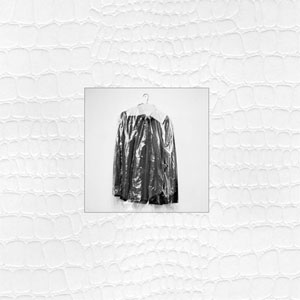John Roberts Fences
An armchair view of John Roberts‘ career would presume that he has grown more worldly […]

An armchair view of John Roberts‘ career would presume that he has grown more worldly in the five years since his debut. The Cleveland-born producer started out merging gritty Midwestern house tropes with the Dial label’s restrained, modern classical sensibilities, though for awhile the former seemed to take precedence; one might describe an early track like “Relate” as swaggering, with its pitched-down hip-hop vocals and clotted bass pressure. Roberts’ stay in Berlin eventually yielded the album Glass Eights, where this attitude was toned down in favor of a decadent—if thoroughly melancholy—type of classical house. Around the time of its release, Roberts launched The Travel Almanac, a travel magazine, with his labelmate Paul Kominek (a.k.a. Pawel), and moved to New York City. In recent interviews, he has mentioned trips to rural Japan, a cabin in upstate New York, and an Ayurvedic spa in Iowa, and these moves really help to parse Fences, his latest LP.
If Glass Eights, with its stark palette of cello, piano, synthesizers, and drum machines, was centered upon the dislocation of an American in Europe, Fences shows the producer attempting a broader range. These instruments are still present, but they are used in tandem with what sound like woody, earthy Asian string instruments, or are at least deployed on Far Eastern scales. Moreover, there is hardly a traditional house rhythm here; the drums tend to be programmed in halftime, or appear in bursts—the rhythms on Jam City’s Classical Curves LP might form a suitable comparison. The result is an album that feels serene and jerky at once, and so a sense of dislocation remains. There is not the same feeling of a young man struggling through a sunless winter in Berlin, but instead one who, having found his sound, is more comfortable exploring intricacy, and is indeed willing to go off the beaten path for his own benefit. This shift may scream self-indulgence to some, but Roberts—who is now around 30 years old—is beginning to shed the immediacy of his earlier work in favor of more abstract themes.
Fences is not necessarily an easy listen, as it contains very few obviously hooky tracks. Roberts’ patient focus on atonality feels rare in the contemporary scene. One recalls the austere end of 1980s post-punk and synth-pop while listening to these tracks, which rarely make immediate concessions to the listener. The closest Fences comes to an emotional climax is on “Shoes,” which is maybe like Ryuichi Sakamoto doing halftime house, as otherworldly synthlines merge with dusty, heartfelt piano and textured, plucked strings. A pizzicato element also forms the backbone of “Calico,” an elastic track led by a rhythm that might be termed as jacking, if its kick drums didn’t only come in halted bursts. On the stumbling “Plaster,” a squirmy lead line breaks down to reveal a solemn flute flourish, and similarly dusty horns appear on tracks like “Fences” and the beautiful, beatless finale “Chalkdust.” Certain Roberts trademarks like reverses, crackle, and other tactile effects pervade. In tandem with pruned, stop/start arrangements, they convey a grainy, soft focus.
Again, Fences makes a lot of sense when one considers Roberts’ journeys to therapeutic locales. It is by and large a kind of holistic listening experience; like an initially painful deep tissue massage, it is quite difficult to enjoy superficially. The artist’s melodic grasp is so ingrained that it may seem submerged, but patiently following his lines as they duck around restless percussion rewards. To say that Fences feels mountainous is too imposing a metaphor, especially for a record under 40 minutes. But it does bear resemblance to scaling a blustery ridge for the sake of sensual experience, rather than for the ultimate view.

